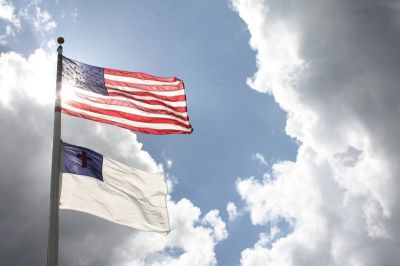What do secular critics of 'Christian Nationalism' really want?

Apparently, any Christian who wants to see just laws grounded in biblical principles and Christian morality enacted in America these days is now a scary “Christian nationalist,” according to secularists.
As Dr. Mark David Hall explained in his white paper on Christian Nationalism for the Freedom Center’s Theology of Politics series, “Christian nationalism is an amorphous concept that is primarily used to tar Christians who are motivated by their faith to advocate for policies that critics don’t like.”
Now, many politically engaged conservative Christians either don’t like — or outright reject — the label of “Christian nationalism.” Many argue that it’s unhelpful, too vague, too provocative, ill-defined, etc. That’s a debate for another day, and there are reasonable arguments on both sides.
But what I think all Christians need to understand is that what the secular opponents of Christian nationalism mean when they use that phrase is just “conservative Christians who vote their values.” One of the main ways they hide this, and simultaneously try to shame and silence conservative Christians, is by accusing them of “lusting for power.”
In this article, I am going to show you, from the primary sources, how these radical secularists do this and then provide a biblical critique of their rhetorical trick.
Because what these activists masquerading as “scholars” want is nothing less than to silence politically engaged conservative Christians. We can’t let that happen. Because what America needs now, more than ever, is even more Christians voting their values and bringing their faith into the public square. That’s not a quest for power, it’s just biblical faithfulness.
Power politics
So, what exactly is this form of “Christian nationalism” that threatens to “destabilize democracy” in the United States? In Taking America Back for God, sociologists Samuel Perry and Andrew Whitehead define Christian nationalism as a “cultural framework — a collection of myths, traditions, symbols, narratives, and value systems — that idealizes and advocates a fusion of Christianity with American civic life.” Their 2020 book sought to expose the “underlying causes and social consequences” of Christian Nationalism by “systemically and empirically [examining] Christian nationalism and its influence in American social, cultural, and political life.”
The empirical basis for their data was built on a six-question survey that asked respondents to weigh in on statements ranging from “the federal government should declare the United States a Christian nation” to “the federal government should enforce strict separation of church and state” to “the success of the United States is part of God’s plan.” Depending on how strongly a respondent agreed or disagreed with the statements, Perry and Whitehead would categorize them as either “Rejectors, Resisters, Accommodators, or Ambassadors” of Christian nationalism.
Interestingly, Perry and Whitehead separate what they understand as Christian nationalism from American “civil religion.” While they appear generally favorable towards civil religion, which they call “America’s dominant self-understanding and ethical lodestar,” they argue that the Christian nationalism they expose — and is dominant in our society — “includes assumptions of nativism, white supremacy, patriarchy, and heteronormativity, along with divine sanction for authoritarian control and militarism.”
And here is where their book, despite any useful data it may contain, begins to go astray. Bundled into their working definition of “Christian nationalism” are foundational and incontrovertible expressions of biblical Christian ethics, such as opposition to abortion and homosexual marriage. Furthermore, front-loaded into the book’s first main argument, “that understanding Christian nationalism and its consequences is essential for understanding much of the polarization in American popular discourse,” is the blatantly political assumption that desiring an enforced physical barrier along the United States southern border is proof-positive of “xenophobia.”
They ask, ‘Why do so many Americans advocate so vehemently for xenophobic policies, such as a border wall with Mexico?” The answer, according to Perry and Whitehead? Christian nationalism.
This is hardly an empirical statement of fact; rather, it is an explicitly political opinion. So we see that, even in the earliest pages of their work, they begin to allow “apparent personal biases [to] color their assessment of what constitutes Christian nationalism,” in the words of Dr. Andrew Walker, professor of ethics at The Southern Baptist Theological Seminary, as quoted in a book review in the Oxford Academic Journal of Church & State.
These biases work their way out onto full display in their chapter “Power.” They argue that “Americans who adhere most strongly to Christian nationalist ideals have political interests primarily in mind. Religious interests rank second if they rank at all.”
But what are the indicators of political interest superseding religious motivations? It’s support for Donald Trump, a desire for a pro-American immigration policy that properly vets refugees, opposition to abortion, and support for the Second Amendment, and so forth. Ultimately, they dismiss any rational biblical basis for these positions and conclude that “Christian nationalism is all about power.”
Similar allegations abound in Katherine Stewart’s book The Power Worshippers: Inside the Dangerous Rise of Religious Nationalism. Stewart argues that:
“For too long now America’s Christian nationalist movement has been misunderstood and underestimated. Most Americans continue to see it as a cultural movement centered on a set of social issues such as abortion and same-sex marriage, preoccupied with symbolic conflicts over monuments and prayers. But the religious right has become more focused and powerful even as it is arguably less representative. It is not a social or cultural movement. It is a political movement, and its ultimate goal is power.”
Here again is that word: power. As she examines the rise of the Moral Majority and their opposition to abortion, support for traditional (biblical) gender roles, etc., it is all viewed through the lens of power. In an interesting admission of disinterest at best and ignorance at worst, Stewart acknowledges that she will “leave it for theologians to decide whether their views are consistent with Christian teachings.”
One would think that the question of whether or not widely held Christian positions on relevant political issues are theologically informed, or even constrained, by Christian theology would be of primary interest to a chronicler of Christian nationalism. Because if so, then said positions are a matter of faithful discipleship, not power politics. But Stewart shows no interest in answering this question.
When describing a visit to a local Baptist church in Unionville, North Carolina, Stewart recounts that a local pastor running for political office gave a speech in which he argued that “God’s straightforward message for women is that they should ‘submit’ to their husbands” and “oppose abortion.” In the next paragraph she notes that “these views may seem far from mainstream … Yet [his] outlook is far from the fringe within Christian nationalist circles.”
This same message — equating pro-life positions, opposition to homosexual marriage, and support for biblical views on gender roles and marriage with a dangerous and destructive Christian nationalism — runs through the entirety of Jesus and John Wayne, Kristin Kobes Du Mez’s recent critique of white evangelicalism and “militant masculinity.” In the book, Du Mez argues that “Christian nationalism … is linked to opposition to gay rights and gun control … and traditionalist gender ideology.”
Critiquing Billy Graham’s message that “the stability of the home was key to both morality and security,” Du Mez casts Graham’s teaching as a “patriarchal interpretation” that “reflected the more reactionary tendencies of early-20th-century fundamentalism.” But Graham took it one step further, Du Mez argues, claiming that he “added a new twist … by wedding patriarchal gender roles to a rising Christian nationalism.”
Apparently, from Billy Graham to your faithful Baptist grandfather, the overriding feature of politically active evangelicalism is a thirst for power made manifest in “Christian nationalism” as a means to achieve certain desired political and cultural dominance.
A biblical critique
What Perry and Whitehead, Stewart, and Du Mez — and all those who echo their characterizations and critiques of what they define as Christian nationalism — fail to address is the stubborn fact that the Bible either explicitly constrains Christians to adopt, or provides more than reasonable support for, the political positions they see as being weaponized for the sake of maintaining power.
In Walker’s review of Taking America Back for God, he provides a critique that applies to all three of the books considered here:
“Their arguments about abortion, same-sex marriage, gender complementarity, and a host of other issues in Christian ethics that they deem elements of Christian nationalism belie the fact that Christians who are pro-life, for example, are not so out of reasons of Christian nationalism but for reasons of creedal orthodoxy.”
Over and against Perry, Whitehead, Du Mez, Stewart, and company, I want to underscore that Christians must unapologetically and wholeheartedly love and embrace God’s created order, vision, and commands for human flourishing — and work to manifest that vision, as faithfully as they can, in their national environment.
This means Christians must embrace a pro-life political posture as an unavoidable outworking of Exodus 20:7, Leviticus 18:2, Leviticus 20:1-5, and Psalm 139:13-16.
Christians must also acknowledge God-given binary gender reality and embrace complementarian gender roles because of the clear teachings of Genesis 1:26-27, Genesis 2:21-25, 1 Corinthians 11:2-16, Ephesians 5:22-33, and 1 Timothy 2:12.
Christians must oppose homosexuality and transgenderism as sin because we are constrained by Genesis 1:26-27, Genesis 19, Leviticus 18:22, Romans 1:24-27, and 1 Corinthians 6:9-11.
Because each of these issues touches on the sacred nature of the Imago Dei and the marriage of our spiritual and physical realities, I argue that to subvert the priority of these concerns to lesser political interests, whether economic, environmental, or even related to the tone and tenor of the political candidate at hand, is to fail to exercise moral judgments in the political realm as guided by Scripture.
Conclusion
Upon closer inspection, it becomes clear that the “Christian nationalism” that contemporary secular critics deride — that is, Christians who advocate for laws that protect life, honor marriage, and acknowledge biological reality both through the national culture and the laws of the land — is nothing more than faithful Christians seeking to steward their God-given political talents in America in such a way as to love God and their neighbor.
As Jason Mattera wrote in his excellent article for the Standing for Freedom Center, “The Canard of Christian Nationalism”:
“Those throwing the biggest temper tantrums regarding Christian nationalism are doing so because they despise any push by Christians to ‘reproduce’ other biblically grounded Christians in the areas of law, politics, and culture.
The real target isn’t Christian Nationalism, whatever that is. Or even ‘people of faith’ in politics.
The real target is conservative Christians in politics.”
You don’t have to adopt, or even like, the term “Christian nationalism” to be able to see that this is what’s really going on.
These secular scholars aren’t trying to silence “Christian nationalists” — they are trying to silence you, the average conservative Christian who reads and believes your Bible and then votes accordingly.
Don’t let them. Fight for the unborn. Fight for marriage. Fight for just laws grounded in Christian morality. And fight for your freedom to live out the one true Christian faith in the public square. Do that — and then don’t care what they call you.
Originally published at the Standing for Freedom Center.
William Wolfe is a visiting fellow with the Center for Renewing America. He served as a senior official in the Trump administration, both as a deputy assistant secretary of defense at the Pentagon and a director of legislative affairs at the State Department. Prior to his service in the administration, Wolfe worked for Heritage Action for America, and as a congressional staffer for three different members of Congress, including the former Rep. Dave Brat. He has a B.A. in history from Covenant College, and is finishing his Masters of Divinity at The Southern Baptist Theological Seminary.
Follow William on Twitter at @William_E_Wolfe



























